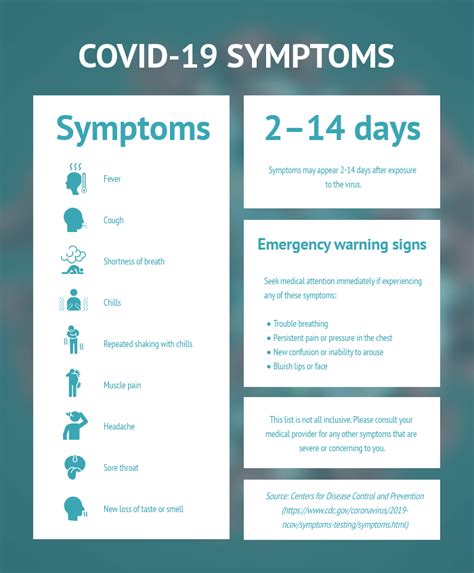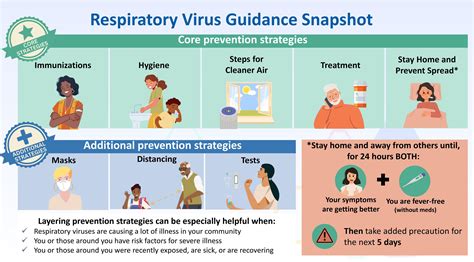Intro
Stay ahead of the curve with our comprehensive guide to Covid symptoms to watch out for in 2025. Learn to identify early warning signs, understand the latest variants, and recognize the difference between mild, moderate, and severe cases. Get expert advice on vaccination, treatment, and prevention strategies to keep you and your loved ones safe.
As the world continues to navigate the complexities of the COVID-19 pandemic, it's essential to stay informed about the symptoms to watch out for, especially as new variants emerge. In 2025, it's crucial to be aware of the signs and symptoms of COVID-19, which can help you take prompt action to protect yourself and those around you.
The COVID-19 pandemic has been a rapidly evolving global health crisis, with new variants and strains emerging regularly. The virus has affected millions of people worldwide, causing a range of symptoms from mild to severe. As we move into 2025, it's essential to stay vigilant and aware of the symptoms to watch out for.

Common COVID-19 Symptoms to Watch Out for in 2025
While the symptoms of COVID-19 can vary from person to person, there are some common signs to watch out for in 2025. These include:
- Fever: A high temperature, usually above 100.4°F (38°C), is a common symptom of COVID-19.
- Cough: A dry or wet cough can be a sign of COVID-19, and may be accompanied by mucus or phlegm.
- Fatigue: Feeling extremely tired or weak is a common symptom of COVID-19.
- Shortness of breath: Difficulty breathing or feeling winded even when sitting still can be a sign of COVID-19.
- Headache: A headache can be a symptom of COVID-19, and may be accompanied by a sore throat or runny nose.
- Sore throat: A sore or scratchy throat can be a sign of COVID-19.
- Runny nose: A runny nose or stuffy nose can be a symptom of COVID-19.
- Body aches: Feeling pain or discomfort in the muscles, back, or other parts of the body can be a sign of COVID-19.
- Diarrhea: Diarrhea or nausea can be a symptom of COVID-19.
- Loss of appetite: Feeling less hungry or having a reduced appetite can be a sign of COVID-19.
- Loss of taste or smell: A reduced or complete loss of taste or smell can be a symptom of COVID-19.
Less Common Symptoms of COVID-19
While the symptoms listed above are common, there are some less common symptoms of COVID-19 to watch out for in 2025. These include:
- Rash: A rash or lesions on the skin can be a sign of COVID-19.
- Discoloration of the fingers or toes: A condition known as "COVID toes" can cause discoloration of the fingers or toes.
- Eye problems: Pink eye, blurred vision, or other eye problems can be a symptom of COVID-19.
- Confusion or disorientation: Feeling confused or disoriented can be a sign of COVID-19, especially in older adults.
How to Protect Yourself from COVID-19 in 2025
While the symptoms of COVID-19 can be concerning, there are steps you can take to protect yourself and those around you in 2025. These include:
- Getting vaccinated: Staying up to date on COVID-19 vaccinations is one of the best ways to protect yourself from the virus.
- Wearing a mask: Wearing a mask in public places can help reduce the transmission of COVID-19.
- Practicing social distancing: Keeping a safe distance from others can help reduce the transmission of COVID-19.
- Washing your hands: Regularly washing your hands with soap and water can help reduce the transmission of COVID-19.
- Staying home when sick: If you're feeling unwell, stay home and avoid contact with others to reduce the transmission of COVID-19.

What to Do If You're Experiencing COVID-19 Symptoms
If you're experiencing symptoms of COVID-19, it's essential to take prompt action to protect yourself and those around you. These steps include:
- Getting tested: If you're experiencing symptoms of COVID-19, get tested as soon as possible.
- Seeking medical attention: If you're experiencing severe symptoms or are at high risk for complications, seek medical attention immediately.
- Staying hydrated: Drinking plenty of fluids can help manage symptoms and reduce the risk of complications.
- Resting: Getting plenty of rest can help your body recover from COVID-19.
Conclusion
In conclusion, staying informed about the symptoms of COVID-19 is crucial in 2025. By knowing what to watch out for and taking steps to protect yourself and those around you, you can reduce the transmission of COVID-19 and stay healthy. Remember to stay vigilant, get vaccinated, and take prompt action if you're experiencing symptoms of COVID-19.
What are the most common symptoms of COVID-19?
+The most common symptoms of COVID-19 include fever, cough, fatigue, shortness of breath, headache, sore throat, runny nose, body aches, diarrhea, loss of appetite, and loss of taste or smell.
How can I protect myself from COVID-19?
+To protect yourself from COVID-19, get vaccinated, wear a mask in public places, practice social distancing, wash your hands regularly, and stay home when sick.
What should I do if I'm experiencing symptoms of COVID-19?
+If you're experiencing symptoms of COVID-19, get tested as soon as possible, seek medical attention if necessary, stay hydrated, and rest to help your body recover.
